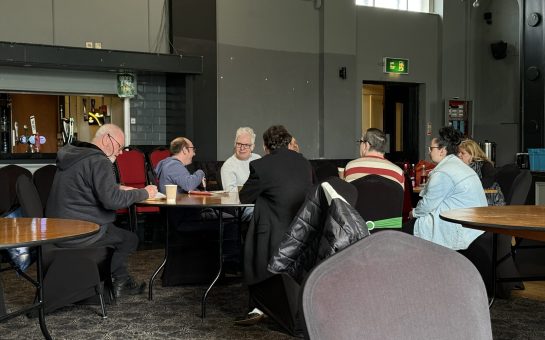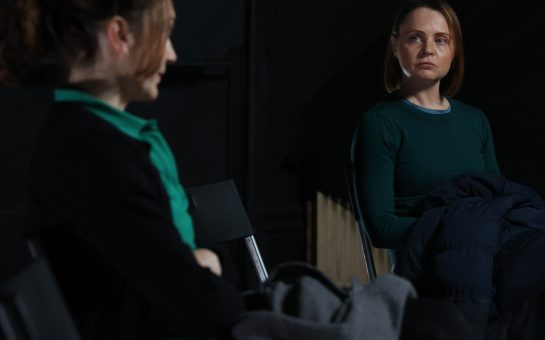Despite dominating politics in the 18th and 19th centuries, it has been 150 years since the Whig Party contested an election in Manchester – but now they’re back!
MM caught up with their Stretford and Urmston candidate, Paul Bradley-Law, to discuss his mission to revive the city’s ‘Whiggish tradition’.
He may be representing one of the UK’s oldest political parties at the general election but Paul is very much a modern man.
We met in the stylish York Street offices of the technology recruitment company he co-founded in 2002, and has run for the past 13 years.
At 40 and married with two young children, Paul seems comfortable in his own skin. He was dressed casually having just returned from a Quad-Treking trip as part of a team building away day for the whole office.
Quad-Treking he explained, after noticing my confusion, involves traversing woodland trails on quad bikes – still, less risky than standing for election he joked.
From the off he was keen to stress the benefit his business background brings to his political outlook.
“As a small business owner you really see the government’s influence”, he said.
However, it was his academic interest in politics – rather than his business experience – combined with a well spotted tweet which drew him to becoming a Whig candidate.
“I’ve always had an interest in politics, from studying it at A-level. And since leaving university I’ve had sort of a casual interest, that spikes around election time,” he explained.
“I’m the sort of person who’s up all night watching the results come in, a bit like other people watch the FA cup final or the super bowl.
“I saw a tweet about the Whigs reforming and it reminded me of my history and my politics. And I thought ‘the Whigs are back, how great’. You know one of those entertaining stories.
“Then I looked up their pre-manifesto on the website and there wasn’t one thing that I didn’t agree with. They were looking for candidates and I thought that would be a tremendous thing to be involved in.
“There are four of us standing in the country. It’s hard being a small party but we support each other.
“People start to take an interest when you tell them what you are doing and that you really are the real Whig party.
“The name and the history that goes with it helps. It attracts attention we might not otherwise get. If we were called the ‘chair party’, you might not be here talking to me.”
Is this all just a bit of fun then – a chance for some historical enthusiasts to grab a bit of publicity and then fade away?
Paul is quick to assure the electorate that the party is very serious about what it is trying to achieve and campaigning very hard.
“There were some great people, some great reformers in The Whigs that did some amazing things,” he said.
“If we’re here just messing around and doing terribly, it is an insult to the legacy that we claim to represent.
“I’ve got to push this as hard as I can. I’ve got to work really hard. I’ve got to try and get the word out because otherwise I’m letting down the name that I claim to represent.”
Paul thinks this is particularly important in his case because of Manchester’s special connection to the Whig tradition.
He said: “Manchester is famous for Whigs and a Whiggish tradition – the Lincoln statue for the cotton processing people who helped end the American Civil War, Peterloo, the Free Trade Hall. There’s a lot of that Whiggish sprit in Manchester.”
Our discussion turned to the present and the party’s manifesto, which quite honestly seems lacking in any specific policy commitments.
Paul admits that the Whig manifesto takes a different approach to the other parties – it shuns a shopping list of policies format – but believes a closer look will reveal the party’s clear commitments.
“We are a very values driven party. We want to occupy the optimistic, progressive centre ground that the other parties have abandoned,” he said.
“We are pro-EU. We’re pro-immigration. We’re in favour of gender equality and human rights. All backed up by sound economics.
“It wouldn’t make sense for us to have a policy for every area as if we were in government, because we are simply not going to be in that situation.
“But by having the values clearly set out, we hopefully show how we might act.
“One of the things we talk about in the manifesto is the idea of creating a new generation of talented young people.
“That’s a value but we also back it up with polices, like free universal childcare and the abolition of tuition fees. So there are commitments in there and they are distinctive.”
He is also quick to stress that it is not just in policy where The Whigs show they are different from other parties, but also in the way they campaign.
“We’re trying to do an entirely positive campaign. It’s all about optimistic, positive, progressive politics,” Paul said.
“We’re not trying to have a dig at other people, we’re just trying to say this is what we stand for. We think there is a missing space in our politics for that right now and we think that’s sad.”
This gap in the political market is what he feels is driving the public’s disconnect with politics.
He said: “Politics has become a little insular, and concerned with small issues. We see the politics of petty differences emerging, with Labour and the Conservatives, out bidding each other on this issue and that issue. It seems small and it’s puts a lot of people off. We want to change that.”
For now, however, he is realistic about the party’s chances at the election and what he hopes to achieve.
“Look I know that the chances are it’s likely I’m not going to win. But I go back to before I became a candidate,” Paul said.
“I was looking through the other parties manifesto’s and I couldn’t find one that I liked. And I thought ‘are other people going to find that as well and then have no one to vote for?’. If I can give them something to vote for, then that is a good thing.
“The better the party does, the better we can do next time. Look at how well Ukip have changed the debate in this country – for the worse I think – despite only having a few MEPs and a couple of MPs.
“Perhaps there is a way for a more positive party to do the same. Perhaps five years from now we’ll have 100 candidates stand, maybe more.
“Katie Price stood in Stretford and Urmston in 2001 and got 716 votes, on a platform which included holidays to Tenerife on the NHS.
“I’d like to beat that. But who knows. I’m working as hard as I can and if I do everything I can, then whatever the result I can live with it.”
It feels like whether he wins or loses, Thursday is likely the beginning, rather than the end for Paul’s political career. So has he enjoyed it?
“I’m loving it. I’m really tired but I would definitely do it again. I’m very proud of Manchester and I’m very proud to live in Manchester,” he said.
“I’d love to be mayor of Manchester one day. But this is all long term. For now I‘m focused on this election. Who knows what the future holds.”
Paul Bradley-Law is standing for the Whig Party in the Stretford and Urmston Constituency. The other candidates standing are:
Louise Ankers (Lib Democrats), Lisa Cooke (Conservative), Kate Green (Labour), Geraldine Coggins (Green), Kalvin Chapman (UKIP) and Paul Carson (Population Party UK).
Who are the Whig Party?
Founded in 1678 during the reign of Charles II, the Whigs – along with the Tories – were the main political party in the 18th and 19th century.
They provided 16 prime ministers and their supporters claim the abolition of slavery and the Great Reform Act as major achievements.
Last time Manchester elected a Whig, Queen Victoria was on the throne.
The party eventually merged with the Liberals in 1868 but was officially reformed in 2014. They are now standing four candidates in this year’s General Election.
Key 2015 Whig Manifesto commitments
• Universal free-early years childcare
• Enable councils to borrow against future rental income to build social housing
• Nationally funded network of rape crisis centres
• Gender quotas to reach 50/50 representation in a decade
• Ban unpaid internships
• Mean’s test pensioner benefits
• Decriminalise Drug use and treat possession as illness not crime
• A landlord’s register and safety of tenure for renters
• Votes for 16yr old’s and online voting
• Move the House of Commons out of London
• A Royal Commission to decide the future of the NHS
• Abolish Tuition fees
• Repeal Legal Aid cuts
• Abolish the Bedroom Tax
• Maintain Foreign Aid commitment
• Scrap Trident and spend the savings on properly equipping the military.
A full copy of the Whig manifesto can be found here.



